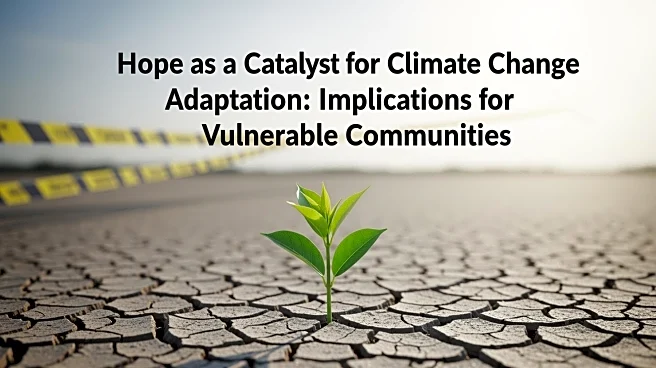What's Happening?
A recent study proposes that hope can significantly enable climate change adaptation, particularly for communities vulnerable to climate impacts. The research highlights the role of hope in fostering collective
and personal adaptation efforts, suggesting that hopeful narratives can improve mental health and increase investment in adaptation strategies. The study introduces the Model of Hope as an Enabler of Climate Change Adaptation (MHECCA), which posits that hope and adaptation are mutually reinforcing. This model draws on evidence from climate change adaptation, affective science, and social psychology, emphasizing the importance of personal, group, and environmental factors in cultivating hope. The study underscores the negative impact of despairing narratives on communities like Tuvalu, where hopelessness has hindered adaptation investments despite local willingness to adapt.
Why It's Important?
The significance of this study lies in its potential to reshape climate change adaptation strategies by integrating hope as a central component. By fostering hope, communities can enhance their adaptive capacity, improve mental health, and attract investment for adaptation projects. This approach could be particularly beneficial for marginalized communities facing severe climate risks, as it offers a pathway to overcome barriers such as poverty and limited resources. The study suggests that hopeful narratives can counteract the negative effects of despair, promoting resilience and proactive adaptation measures. This has implications for policymakers, investors, and climate activists seeking to support vulnerable populations in their adaptation efforts.
What's Next?
Further research is needed to empirically test the MHECCA model and explore the relationship between hope and adaptation in various contexts. Policymakers and climate advocates may consider incorporating hopeful narratives into their communication strategies to enhance public engagement and support for adaptation initiatives. Additionally, there is potential for developing interventions that increase hope levels in communities, thereby fostering collective action and resilience. As the study highlights, understanding the dynamics of hope and adaptation could lead to more effective strategies for addressing climate change impacts, particularly in regions with high vulnerability.
Beyond the Headlines
The study raises ethical considerations regarding the portrayal of climate risks and the responsibility of media, governments, and NGOs in shaping public perception. By focusing on hopeful narratives, stakeholders can contribute to a more balanced discourse that empowers communities rather than instilling fear and hopelessness. This approach aligns with broader efforts to promote sustainable development and social justice, emphasizing the need for inclusive and participatory adaptation strategies.









